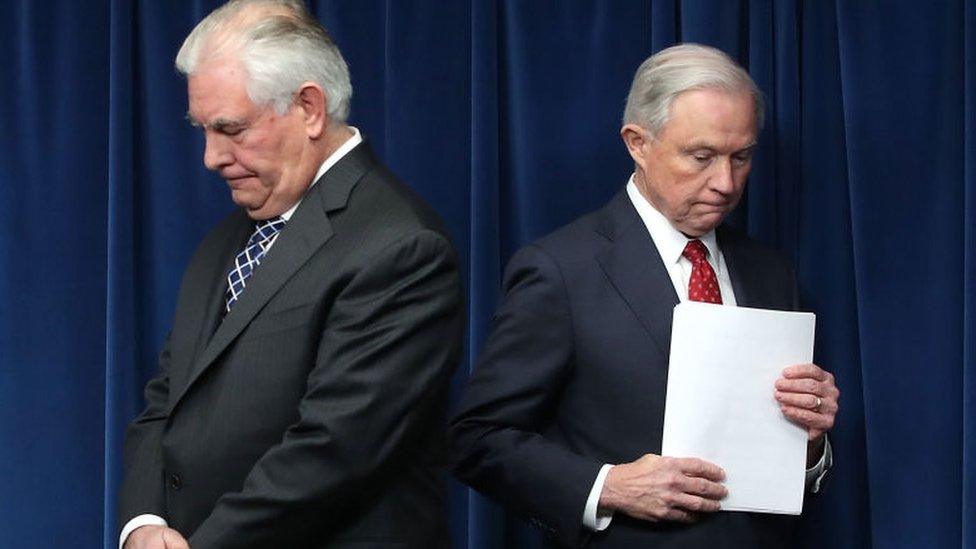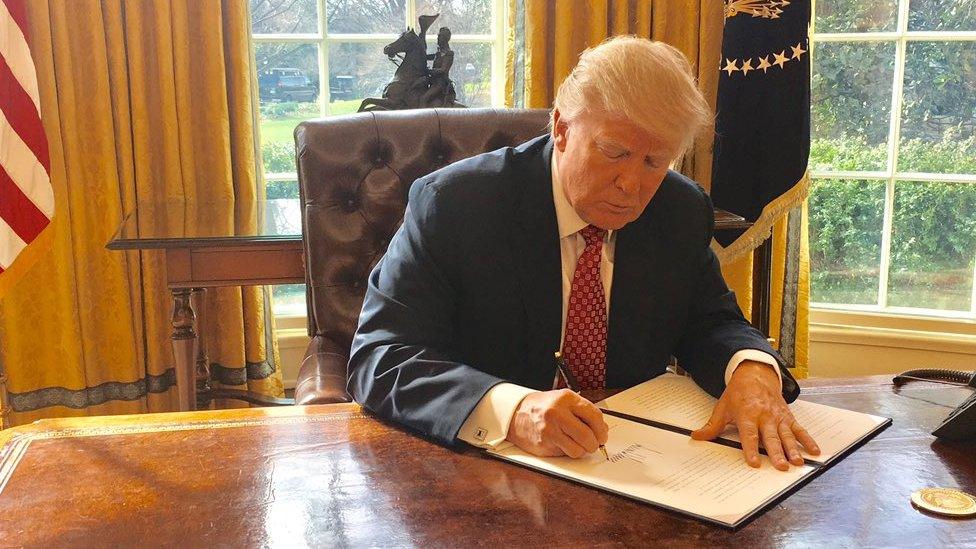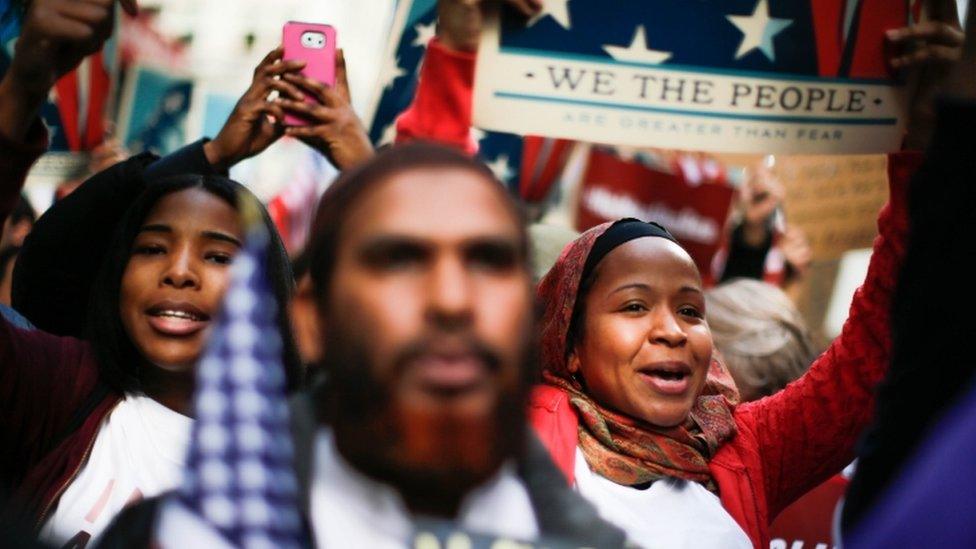Will Trump's new travel ban be halted again in court?
- Published

Secretary of State Rex Tillerson (left) and Attorney General Jeff Sessions announce the new travel ban to reporters
After its first travel ban was indefinitely bogged down by court challenges, the Trump administration has returned with a more detailed, narrowly focused order. That doesn't mean it won't meet the same fate, however.
The action, which suspends new visas to nationals from six majority Muslim nations for 90 days and halts the processing of new refugees for 120 days, is still a marked change of US policy. It will also, undoubtedly, be challenged quickly in US courts.
The pressing question is whether those challenges will result in the order being suspended during legal proceedings, or if it will be allowed to take effect while lawyers file their briefs and slog it out in oral arguments.
Unlike the first order, the new effort was clearly written with the input of government lawyers and not just policy operatives like White House advisers Steve Bannon and Stephen Miller. The order addresses many of the previous ban's legal vulnerabilities and takes into account the court rulings that scuttled the previous incarnation.
Multiple agencies were consulted in its drafting, and the rollout has been much more deliberate. The announcement was delayed twice, for instance, after Mr Trump first indicated that it was coming within days of his 16 February press conference.
The Seattle-based federal judge who granted an initial suspension of the original 27 January travel ban said he acted with urgency because the presidential memorandum violated the rights to due process of US citizens and legal immigrants by casting doubt on the validity of green cards issued to permanent US residents and existing travel visas. This was also the reason the Ninth Circuit US Court of Appeals upheld that injunction.
Rex Tillerson: "President Trump is exercising his rightful authority to keep our people safe"
Those concerns have largely been remedied in this latest order, as the language makes clear that all existing immigration documents will be honoured. Unlike the original action, the new directive also delays implementation of the travel restrictions for 10 days, which will give border and customs agents, US diplomats and other government officials time to fully educate the public on the nature of the changes.
Both the Seattle court and the Ninth Circuit had cited the confusion surrounding the original action as a reason for putting it on hold.
The new order will still have an adverse impact on foreign students and workers from the six nations in question (Iraq has been removed from the list), as they may not be able to re-enter the US if they were to go home to visit family or friends. The situation for them, however, isn't nearly as dire as under the earlier order. There is also explicit permission given to government officials to grant visas to prohibited nationals on a "case-by-case" basis.
That leaves a First Amendment freedom of religion challenge as the most likely avenue for legal efforts to derail implementation of the new immigration order. On 14 February a federal judge suspended the original effort in Virginia because she said it was probably motivated by "religious prejudice" and not "rational national security concerns".
She cited Candidate Trump's December 2015 call for a blanket prohibition on the entry of all Muslims into the US, as well as comments by Trump advisers before and after the election, as evidence supporting this conclusion.
Trump travel ban: US children give their views
"The 'Muslim Ban' was a centrepiece of the president's campaign for months, and the press release calling for it was still available on his website as of the day this Memorandum Opinion is being entered," she wrote.
While the Ninth Circuit did not base its decision upholding the nationwide injunction on religious freedom grounds, the judges were clear that Mr Trump's past statements about Muslims could be taken into account in future legal proceedings.
"The States' claims raise serious allegations and present significant constitutional questions," the judges held, referring to the portion of the challenge to the order on religious grounds brought by the states of Washington and Minnesota.
Critics of the new order are already honing in on what they see as the religious aspect of the order - targeting six nations that are all majority Muslim - as its primary legal shortcoming.
The Trump administration, writes Omar Jadwat of the ACLU's Immigration Rights Project, has replaced the original "Muslim ban" with "a scaled-back version that shares the same fatal flaws".
"The only way to actually fix the Muslim ban is to not have a Muslim ban," he continues. "Instead, President Trump has recommitted himself to religious discrimination, and he can expect continued disapproval from both the courts and the people."
The Trump administration also has made some efforts to defend the new order against this challenge. Gone is the provision that would have given Christian minorities priority over Muslims when the 120-day suspension of the refugee program was lifted. Syria is no longer singled out for an indefinite refuge ban, as well.
Meet the Arab American family divided over Trump
When lawsuits are eventually filed, expect the parties to introduce plenty of evidence of Mr Trump's past support for anti-Muslim action, including his vociferous defence of the original immigration order. (This could explain why the president has taken a much lower profile in unveiling this new effort, signing the memorandum in a private ceremony and relying on Cabinet officials to explain the details).
Although the White House is showing restraint with this latest move, and the text of the new order says the previous attempt has been fully rescinded, the Trump team continues to defend the appropriateness and legality of the original action - a move that could complicate their legal defence going forward.
"Fundamentally, you're still going to have the same basic policy outcome for the country," White House's Miller said recently in a preview of the new order. It would be "responsive to a lot of very technical issues that were brought up by the court", he continued, while asserting that the original order was not "flawed".
That particular comment prompted a quick reply from the ACLU, which had challenged the original order.
"So then we will have the same basic response," it tweeted.
That's not quite Donald Trump's "we'll see you in court" bravado following the adverse decision by the Ninth Circuit in February - but the end result is the same.
Judges are going to have the final say.
- Published6 March 2017

- Published26 June 2018

- Published7 February 2017